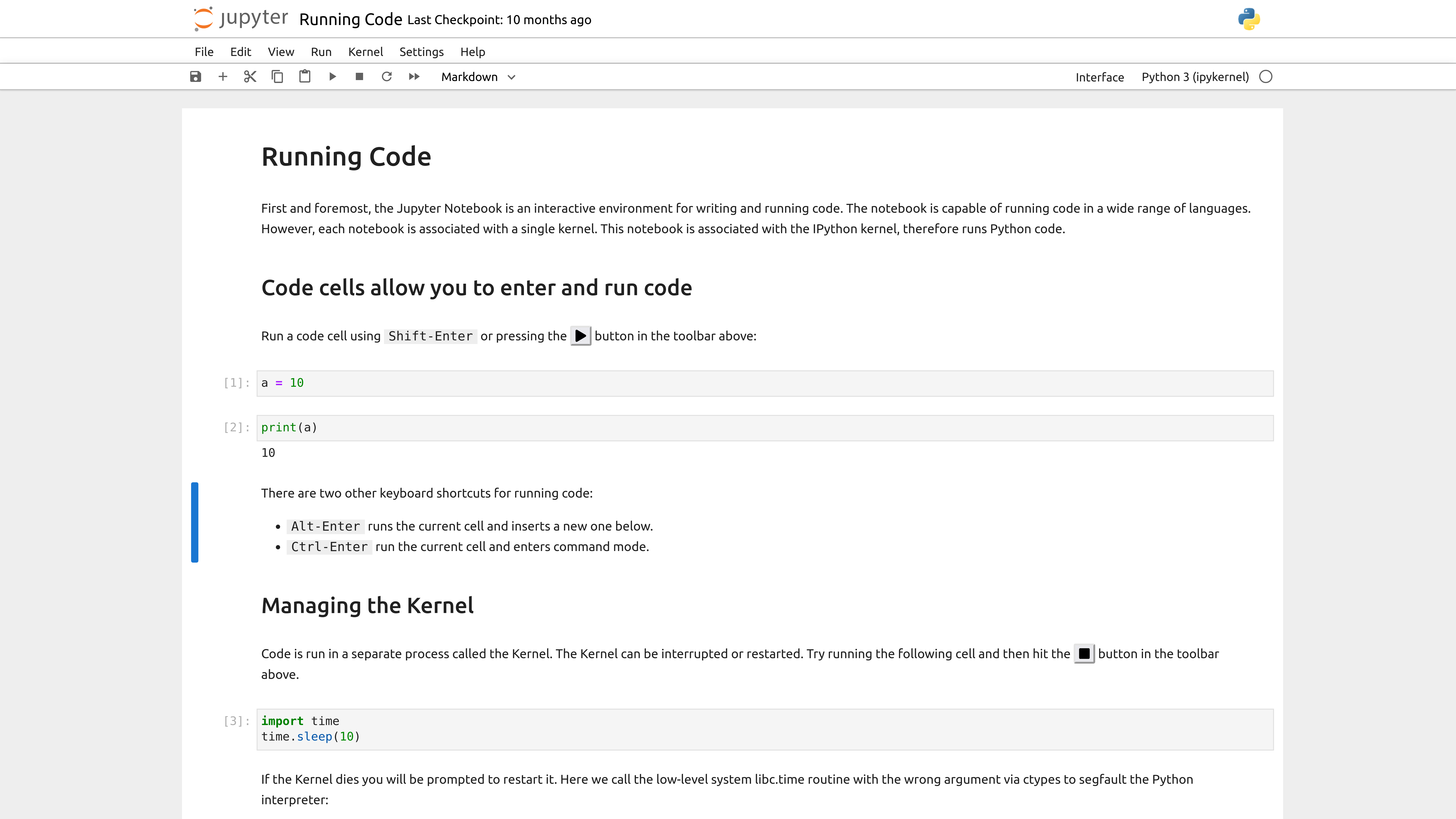* fix: Update lower bound of required python to 3.9 * Ignore UP006
Jupyter Notebook
The Jupyter notebook is a web-based notebook environment for interactive computing.
Maintained versions
We maintain the two most recently released major versions of Jupyter Notebook, Classic Notebook v6 and Notebook v7. Notebook v5 is no longer maintained. All Notebook v5 users are strongly advised to upgrade to Classic Notebook v6 as soon as possible.
Upgrading to Notebook v7 may require more work, if you use custom extensions, as extensions written for Notebook v5 or Classic Notebook v6 are not compatible with Notebook v7.
Notebook v7
The newest major version of Notebook is based on:
- JupyterLab components for the frontend
- Jupyter Server for the Python server
This represents a significant change to the jupyter/notebook code base.
To learn more about Notebook v7: https://jupyter.org/enhancement-proposals/79-notebook-v7/notebook-v7.html
Classic Notebook v6
Maintenance and security-related issues only are now being addressed in the 6.5.x branch.
It depends on nbclassic for the HTML/JavaScript/CSS assets.
New features and continuous improvement is now focused on Notebook v7 (see section above).
If you have an open pull request with a new feature or if you were planning to open one, we encourage switching over to the Jupyter Server and JupyterLab architecture, and distribute it as a server extension and / or JupyterLab prebuilt extension. That way your new feature will also be compatible with the new Notebook v7.
Jupyter notebook, the language-agnostic evolution of IPython notebook
Jupyter notebook is a language-agnostic HTML notebook application for Project Jupyter. In 2015, Jupyter notebook was released as a part of The Big Split™ of the IPython codebase. IPython 3 was the last major monolithic release containing both language-agnostic code, such as the IPython notebook, and language specific code, such as the IPython kernel for Python. As computing spans across many languages, Project Jupyter will continue to develop the language-agnostic Jupyter notebook in this repo and with the help of the community develop language specific kernels which are found in their own discrete repos.
Installation
You can find the installation documentation for the Jupyter platform, on ReadTheDocs. The documentation for advanced usage of Jupyter notebook can be found here.
For a local installation, make sure you have pip installed and run:
pip install notebook
Usage - Running Jupyter notebook
Running in a local installation
Launch with:
jupyter notebook
Running in a remote installation
You need some configuration before starting Jupyter notebook remotely. See Running a notebook server.
Development Installation
See CONTRIBUTING.md for how to set up a local development installation.
Contributing
If you are interested in contributing to the project, see CONTRIBUTING.md.
Community Guidelines and Code of Conduct
This repository is a Jupyter project and follows the Jupyter Community Guides and Code of Conduct.
Resources
- Project Jupyter website
- Online Demo at jupyter.org/try
- Documentation for Jupyter notebook
- Korean Version of Installation
- Documentation for Project Jupyter
- Issues
- Technical support - Jupyter Google Group
About the Jupyter Development Team
The Jupyter Development Team is the set of all contributors to the Jupyter project. This includes all of the Jupyter subprojects.
The core team that coordinates development on GitHub can be found here: https://github.com/jupyter/.
Our Copyright Policy
Jupyter uses a shared copyright model. Each contributor maintains copyright over their contributions to Jupyter. But, it is important to note that these contributions are typically only changes to the repositories. Thus, the Jupyter source code, in its entirety is not the copyright of any single person or institution. Instead, it is the collective copyright of the entire Jupyter Development Team. If individual contributors want to maintain a record of what changes/contributions they have specific copyright on, they should indicate their copyright in the commit message of the change, when they commit the change to one of the Jupyter repositories.
With this in mind, the following banner should be used in any source code file to indicate the copyright and license terms:
# Copyright (c) Jupyter Development Team.
# Distributed under the terms of the Modified BSD License.

